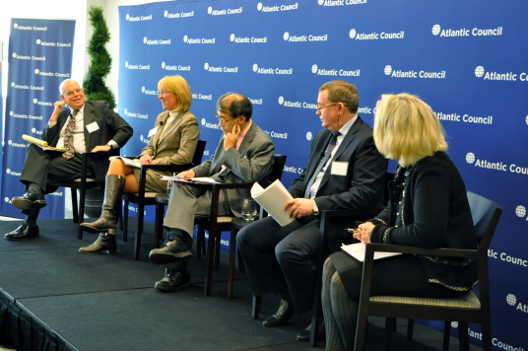 In the first event of the joint Brent Scowcroft Center on International Security and Energy and Environment Program‘s Geopolitics Initiative, this event engaged senior US, Russian, Asian, and European experts in a strategic conversation on multilateral cooperation on the broad issues of energy for the Asia-Pacific region, including sources of supply; climate change impacts on the food, water, energy nexus; and energy trade and maritime route security.
In the first event of the joint Brent Scowcroft Center on International Security and Energy and Environment Program‘s Geopolitics Initiative, this event engaged senior US, Russian, Asian, and European experts in a strategic conversation on multilateral cooperation on the broad issues of energy for the Asia-Pacific region, including sources of supply; climate change impacts on the food, water, energy nexus; and energy trade and maritime route security.
Panel I: Energy Sources for the Asia-Pacific: Geopolitical Perspectives
In this panel, the main theme was what the energy market will look like as the demand for energy comes from the Asia Pacific region. As a resource-poor region, evidenced by countries such as Japan, the Asia Pacific will require that its energy needs are met as their economies and populations grow. Russia, a usual player in the energy market, will also try to maintain its stake in the energy market even as the demand moves east.
Main issues discussed included:
- What energy sources will the region demand?
- How will they get to those who demand it?
- What is the role of a government in obtaining these energy resources?
- What is the role of Western countries—such as the United States and Canada—in supplying the energy that is demanded?
Panel II: Climate Change Impacts on Food, Water, and Energy in the Asia Pacific
This panel highlighted to important and related opportunities in addressing climate change impacts on food, water, and energy: modeling and insurance. Climate change models show that we need to adapt to future changes. In developing countries, such as China, demand will increase and developing sustainable sources of food, water, and energy are necessary in the long-term. Today, there is a climate resilience gap and assets are not prepared. Insurance has the capacity to facilitate the necessary resilience in existing social structures to assist in adaptation to climate change.
Main issues discussed included:
- How can the global society deal with the climate change risks?
- What concerns are there regarding climate refugees in the Asia Pacific region?
- What is the role of technology for predicting and combating climate change?
Panel III: Securing and Developing Trade and Maritime Routes
The final panel centered on the theme of cooperation versus confrontation in the Asia Pacific regarding trade and maritime routes. Various factors favor confrontation in the future such as resource competition, regional politics, and maritime border disputes. Furthermore, despite some increase in the use of Arctic passages, the Arctic is not yet a principle transit route. Therefore, the Asia Pacific energy supply chain is largely reliant Pacific maritime routes.
Main issues discussed included:
- What routes are most likely to be used in the future energy supply chain in the Asia Pacific region?
- What are the major influencers of cooperation and confrontation in the region?
- What is the future of the Arctic both as a viable maritime trade route and a source of energy resources?
